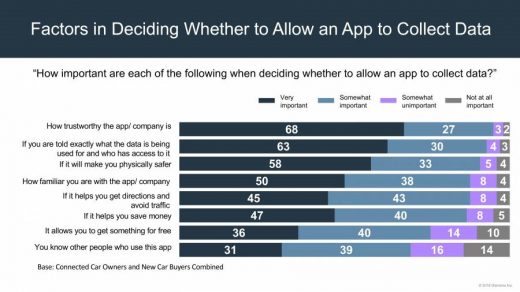Data Privacy Attitudes and Connected Cars: A Deeper Look
Data Privacy Attitudes and Connected Cars: A Deeper Look
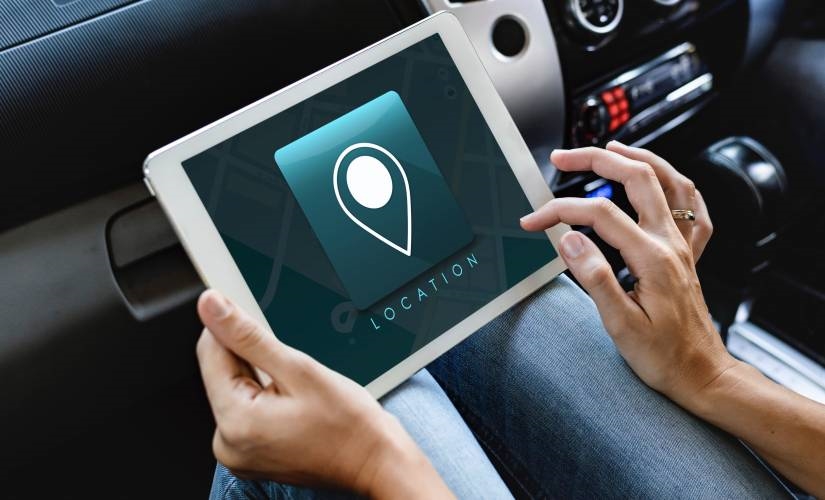
2019 may well be a tipping point in consumer and public policymakers’ attitudes about data privacy. The year 2018 started out with an explosion of revelations about consumers’ data being shared with companies without their consent. With connected cars soon to become the norm for new car sales, automotive original equipment (OEMs) need to take note of consumers’ attitudes about the data that their cars will be emitting.
Connected Car Data Sharing: A New Realm Emerges in a Reign of Distrust
Not surprisingly, the consumers who participated in our recent consumer study on connected car data sharing expressed concerns. about sharing their data with various types of businesses and government entities. A full 66 percent of connected car owners and 64 percent of new car buyers say that at some point, they’ve chosen not to use an online service or app because they were worried about how their personal information would be handled.
Data Privacy Concerns Have Demographic Differences
Among connected car owners, women are more likely to say they have chosen not to use a service because of data privacy concerns than men are.
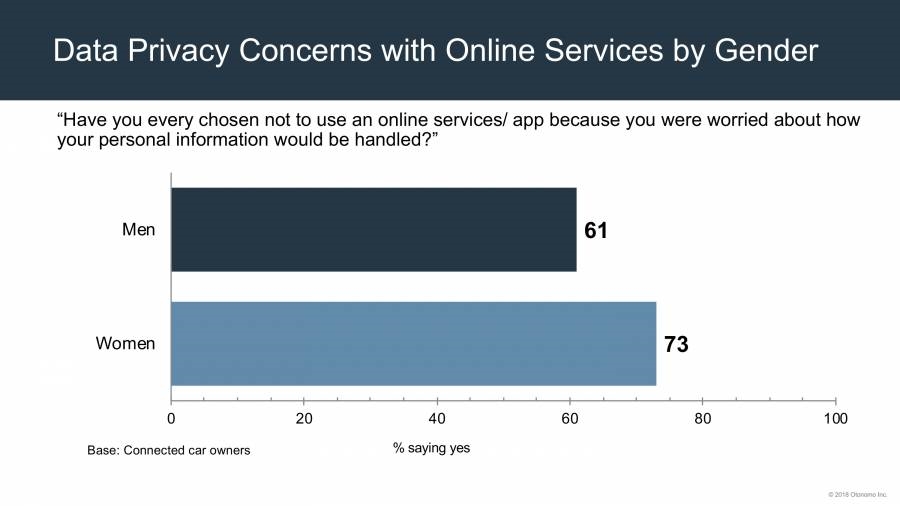
Connected car owners age 55+ are more likely not to a connected car app service for security reasons. 76 percent of older car owners say they have chosen not to use an app because of concerns about their personal information. Younger drivers have not experienced the devastations of losing entire fortunes due to data breaches. 63 percent of 18-34 year olds and 62 percent of 35-54 year olds don’t worry about their data.
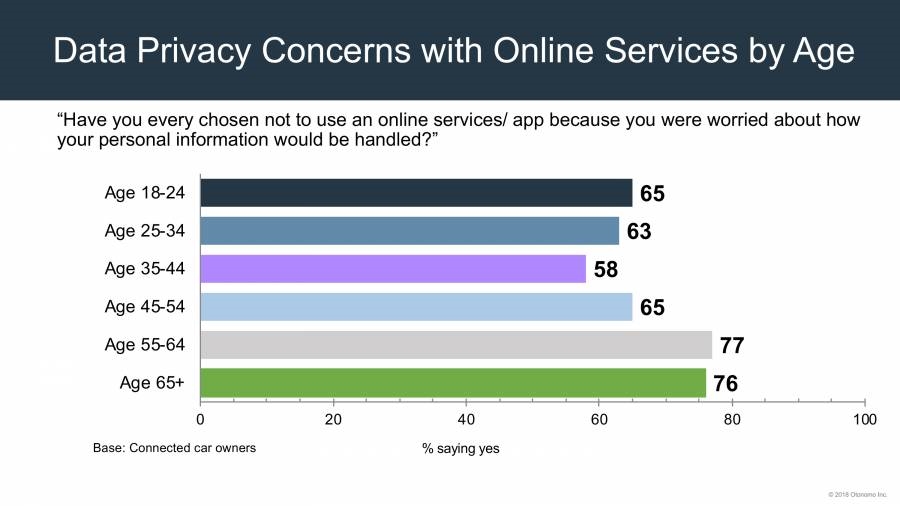
Yet Data Privacy Concerns Don’t Necessarily Halt Consumers’ Data Sharing Habits
Like most American consumers, connected car owners are already using a plethora of technologies that collect and use their anonymous or personal data. Of our survey respondents:
- 93% of connected car owners have a navigation service such as Google Maps or Waze installed on their phones
- 85% say they have installed a ridesharing app such as Uber/Lyft, a money transfer app such as Apple Pay, Google Pay, PayPal or Venmo, a mobile banking app, or a dating app such as eHarmony, Match.com, or Tinder
- 85% own at least one of these devices that typically collect personal data: an Internet-connected smart TV, an Internet-connected watch, a voice-enabled wireless speaker, or an activity tracker such as a FitBit
Demand for apps and services is still red hot even as consumers’ data privacy concerns have gotten warmer. This is borne out by our findings with respect to connected car data: Approximately 80% of those connected car owners and new car buyers who expressed interest in new services based on connected car data (including real-time alerts of dangerous driving conditions, early detection of maintenance and repairs, and even faster response times from emergency responders in the event of an accident) stated a willingness to share their data in order to gain access to these capabilities.
When It Comes to Data Privacy, Are Policymakers on the Right Track?
Recently, public policymakers and courts have taken actions to protect consumer rights to data privacy:
- Soon after the European Union’s General Data Protection Regulation went into effect, California passed a digital privacy law that requires companies to disclose what information they are collecting, why, and with whom it’s being shared. It also gives consumers the “right to forget” and to prevent their data from being sold. Brazil has also passed a law that follows GDPR provisions.
- Senator Ron Wyden (D-OR) convinced Verizon to stop selling data to geolocation aggregators, after KrebsOnSecurity reported that LocationSmart was leaking real-time location data from customers on every major US carrier through a free demo tool on its website. (Fortunately this tool has been taken down.)
- The US Supreme Court ruled that law enforcement needs a warrant to conduct mobile surveillance.
So how do these developments align with what connected car owners and new car buyers say they want when it comes to data privacy? Actually, quite a bit.
Transparency Matters to Consumers – a Lot
Aside from trusting a specific brand, transparency is the number one factor driving consumers’ decisions about whether to share their data. 63% of consumers in our study stated they want to be told what data is being collected, how it is being used, and by whom.
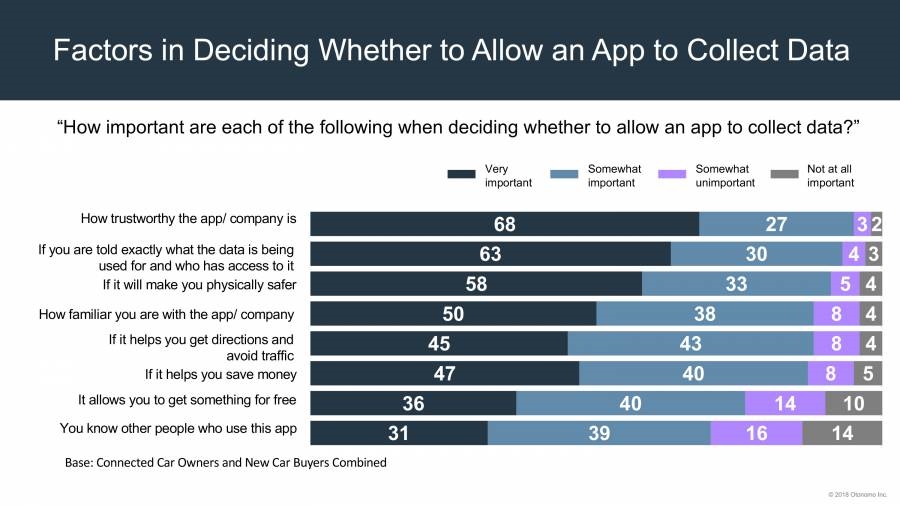
Action Items for Automakers Include New Processes and Policies
Connected cars make it possible for companies and governments to deliver diverse new services using connected car data, so automotive OEMs should look closely at drivers’ data sharing attitudes. Many have already invested in building trustworthy brands, and the next step is to build processes that give consumers a clear picture about how connected car data sharing works.
Are there other steps that automotive OEMs can take to give consumers more confidence in connected car data sharing?
- The use of passwords does seem to impart an additional air of security, though 25% of our drivers say that a password wouldn’t make a difference in whether they decided to use a connected car feature.
- Two-factor authentication might help. Though many consumers say they can’t be bothered, 61% of connected car owners and new car buyers say that they are already using two-factor authentication when they use online apps and services.
The full survey report is available here.
Research Survey
The Otonomo-Edison Research Survey is a US online survey of 1,070 persons 18 and older. Of that total, 514 were connected car owners, and 794 planned to purchase a new car in the next year (note: there was some overlap between the two groups.) Participants were recruited through Survey Sampling International using their online panel. The survey was fielded by Edison Research in April and May 2018.
The data was weighted to match the most recent United States population estimates from the U.S. Census Bureau for age, sex, and race.
The post Data Privacy Attitudes and Connected Cars: A Deeper Look appeared first on ReadWrite.
(62)

